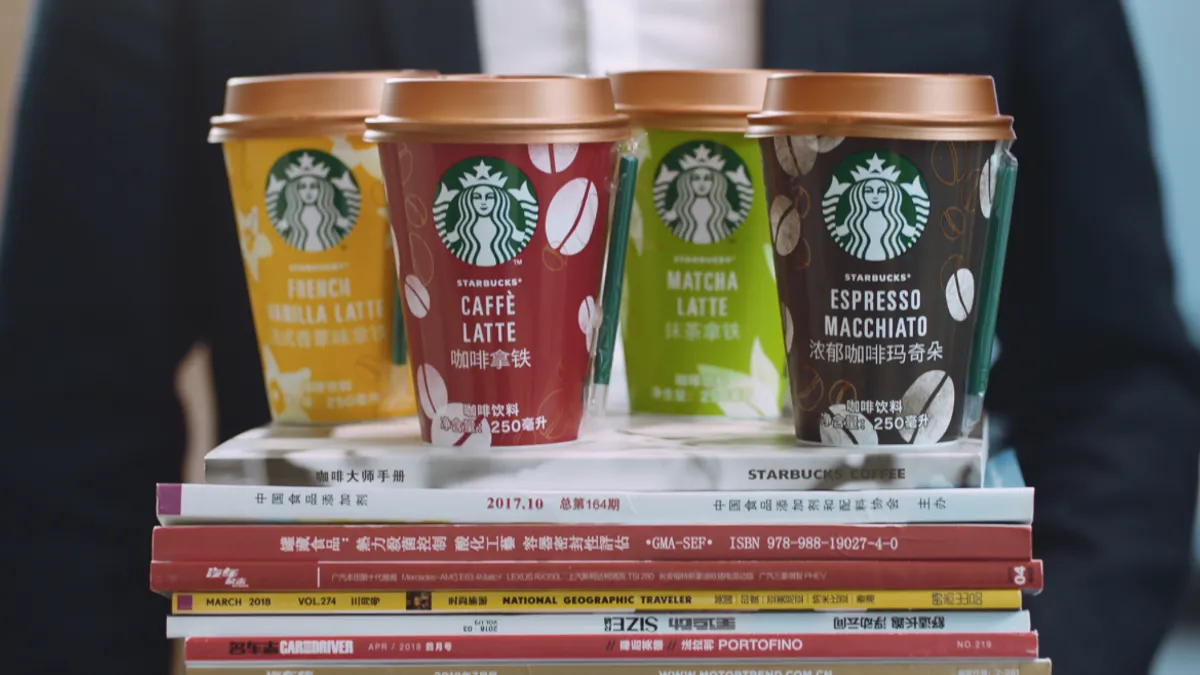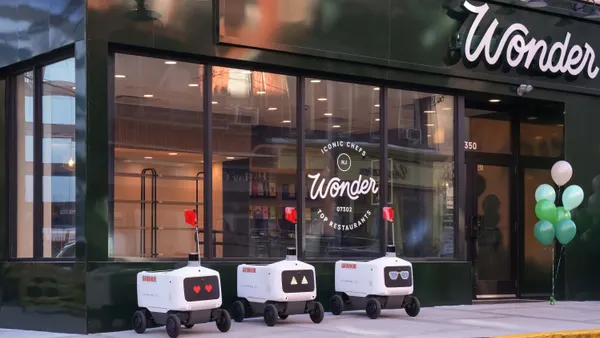Dive Brief:
- On the heels of Starbucks’ stronger-than-expected fourth-quarter earnings last week, the company announced it is expanding delivery in China to 1,100 stores through its partnership with Alibaba and its Ele.Me delivery service, according to a company release.
- The partnership between Starbucks and Alibaba was announced in August and the pilot delivery services began in September in Beijing and Shanghai. It is now available in 17 Chinese cities and is on track to expand to more than 2,000 stores in 30 cities by the end of this year.
- In May, the Seattle-based company announced it plans to open 3,000 stores in mainland China throughout the next few years and wants to almost double its number to 6,000 before the end of 2022.
Dive Insight:
Starbucks CEO Kevin Johnson told CNBC that Starbucks plans to leverage what it learns from its delivery expansion in China and apply them to the U.S. market.
The China market is undoubtedly an ideal case study for Starbucks to learn logistics before going all in elsewhere. As Johnson said, the pace of innovation in the market is “faster than any other part of the world.” It is also Starbucks’ fastest-growing market, with a new store opening every 15 hours.
Corey Pierson, CEO of Custora, told Digiday consumers are further ahead on mobile shopping and commerce in China and their demand for delivery is growing. Express package deliveries in China grew more than 42% from 2014 to 2017, for example. In other words, China provides a sort of glimpse into the future of delivery and technology.
But that doesn’t mean the China and the U.S. markets are — or will be — parallel, or that it will be easy for Starbucks to translate its China success in the U.S. Whereas the market is mature in the U.S., for example, coffee demand is on the ground floor in China and consumption of the drink has nearly tripled in the past four years.
“The rising middle class will drive coffee growth and an increased demand for Starbucks,” Belinda Wong, CEO of Starbucks China, told shareholders in March.
Additionally, although Starbucks has had much success on its own in mobile, it does not have a similar tech partner like Alibaba in the U.S. Because of its partnership with Alibaba, Starbucks has established delivery kitchens for fulfillment during its China pilot, which is a critical component for delivery as demand ramps up. It is also integrating multiple platforms to create a virtual store, so experiences for in-store and online customers are seamless. Alibaba introduced its New Retail push in 2016 to merge online and offline experiences, according to a Starbucks press release, and the company rivals that of Amazon’s in e-commerce. The goal with the merger is to simply leverage data and attract consumers into both the Starbucks and Alibaba systems, according to VentureBeat, which will further allow Starbucks to learn where demand is highest as it continues to expand its footprint. That is simply a lot to catch up on considering Starbucks has barely even made a dent on delivery in the U.S.
There is also a tumultuous economy to navigate as tariffs affect U.S. corporations operating in China. Johnson, however, seems dismissive of this issue, noting that “there’s always something going on in geopolitical relationships…” and that Starbucks will continue to play "the long game.”
Starbucks also has a hot startup to contend with in China. Luckin Coffee is also leveraging rising coffee demands in China and is undercutting Starbucks with lower prices. The startup just joined the $1 billion unicorn club and is using some of that money to aggressively grow its e-commerce and delivery footprints. So, while Starbucks is bullish on China delivery, the anticipated learnings may not come as easy as anticipated.











